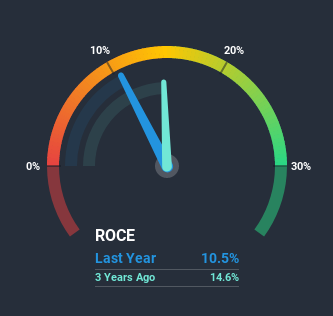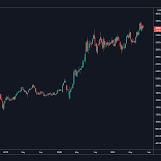To avoid investing in a business that's in decline, there's a few financial metrics that can provide early indications of aging. A business that's potentially in decline often shows two trends, a return on capital employed (ROCE) that's declining, and a base of capital employed that's also declining. This indicates the company is producing less profit from its investments and its total assets are decreasing. In light of that, from a first glance at BSL (NSE:BSL), we've spotted some signs that it could be struggling, so let's investigate.
Return On Capital Employed (ROCE): What is it?
For those who don't know, ROCE is a measure of a company's yearly pre-tax profit (its return), relative to the capital employed in the business. The formula for this calculation on BSL is:
Return on Capital Employed = Earnings Before Interest and Tax (EBIT) ÷ (Total Assets - Current Liabilities)
0.11 = ₹111m ÷ (₹3.2b - ₹2.1b) (Based on the trailing twelve months to June 2020).
Thus, BSL has an ROCE of 11%. In absolute terms, that's a satisfactory return, but compared to the Luxury industry average of 8.6% it's much better.
Check out our latest analysis for BSL

Historical performance is a great place to start when researching a stock so above you can see the gauge for BSL's ROCE against it's prior returns. If you want to delve into the historical earnings, revenue and cash flow of BSL, check out these free graphs here.
What Can We Tell From BSL's ROCE Trend?
There is reason to be cautious about BSL, given the returns are trending downwards. About five years ago, returns on capital were 18%, however they're now substantially lower than that as we saw above. Meanwhile, capital employed in the business has stayed roughly the flat over the period. This combination can be indicative of a mature business that still has areas to deploy capital, but the returns received aren't as high due potentially to new competition or smaller margins. So because these trends aren't typically conducive to creating a multi-bagger, we wouldn't hold our breath on BSL becoming one if things continue as they have.
While on the subject, we noticed that the ratio of current liabilities to total assets has risen to 67%, which has impacted the ROCE. If current liabilities hadn't increased as much as they did, the ROCE could actually be even lower. And with current liabilities at these levels, suppliers or short-term creditors are effectively funding a large part of the business, which can introduce some risks.The Bottom Line On BSL's ROCE
All in all, the lower returns from the same amount of capital employed aren't exactly signs of a compounding machine. Investors haven't taken kindly to these developments, since the stock has declined 44% from where it was five years ago. That being the case, unless the underlying trends revert to a more positive trajectory, we'd consider looking elsewhere.
BSL does come with some risks though, we found 4 warning signs in our investment analysis, and 3 of those are significant...
If you want to search for solid companies with great earnings, check out this free list of companies with good balance sheets and impressive returns on equity.
If you decide to trade BSL, use the lowest-cost* platform that is rated #1 Overall by Barron’s, Interactive Brokers. Trade stocks, options, futures, forex, bonds and funds on 135 markets, all from a single integrated account. Promoted
Valuation is complex, but we're here to simplify it.
Discover if BSL might be undervalued or overvalued with our detailed analysis, featuring fair value estimates, potential risks, dividends, insider trades, and its financial condition.
Access Free AnalysisThis article by Simply Wall St is general in nature. It does not constitute a recommendation to buy or sell any stock, and does not take account of your objectives, or your financial situation. We aim to bring you long-term focused analysis driven by fundamental data. Note that our analysis may not factor in the latest price-sensitive company announcements or qualitative material. Simply Wall St has no position in any stocks mentioned.
*Interactive Brokers Rated Lowest Cost Broker by StockBrokers.com Annual Online Review 2020
Have feedback on this article? Concerned about the content? Get in touch with us directly. Alternatively, email editorial-team@simplywallst.com.
About NSEI:BSL
BSL
A textile company, engages in the manufacture and sale of various yarns and fabrics in India and internationally.
Slight risk second-rate dividend payer.
Similar Companies
Market Insights
Weekly Picks


Looking to be second time lucky with a game-changing new product

PlaySide Studios: Market Is Sleeping on a Potential 10M+ Unit Breakout Year, FY26 Could Be the Rerate of the Decade


Inotiv NAMs Test Center

This isn’t speculation — this is confirmation.A Schedule 13G was filed, not a 13D, meaning this is passive institutional capital, not acti
Recently Updated Narratives


Freehold: Offers a fantastic growth-income intersection up to $50 WTI. Below $50 WTI, it may offer historic opportunities in terms of ROI.


Beyond the "Value Trap"—Defending the $50 Intrinsic Floor


The "Geopolitical Discount" vs. The Monopolistic Floor: The Two Narratives of TSM
Popular Narratives


Is Ubisoft the Market’s Biggest Pricing Error? Why Forensic Value Points to €33 Per Share


The "Physical AI" Monopoly – A New Industrial Revolution


Analyst Commentary Highlights Microsoft AI Momentum and Upward Valuation Amid Growth and Competitive Risks
Trending Discussion

This article completely disregards (ignores, forgets) how far China is in this field. If Tesla continues on this path, they will be fighting for their lives trying to sell $40000 dollar robots that can do less than a $10000 dollar one from China will do. Fair value of Tesla? It has always been a hype stock with a valuation completely unbased in reality. Your guess is as good as mine, but especially after the carbon credit scheme got canned, it is downwards of $150.



